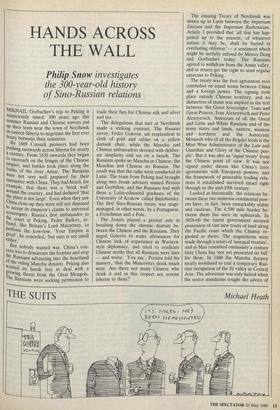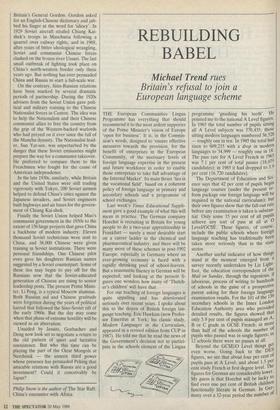HANDS ACROSS THE WALL
the 300-year-old history of Sino-Russian relations
MIKHAIL Gorbachev's trip to Peking is auspiciously timed. 300 years ago this summer Russian and Chinese envoys put UP their tents near the town of Nerchinsk III eastern Siberia to negotiate the first ever treaty between their countries.
BY 1689 Cossack pioneers had been pushing eastwards across Siberia for nearly a century. From 1650 onwards they began to encroach on the fringes of the Chinese empire, and battles took place along the banks of the river Amur. The Russians were not very well prepared for their encounter with China. They had heard, for example, that there was a 'brick wall' around the country, and had deduced 'that the place is not large'. Even when they saw China close-up they were still not disposed to accept its emperor's claims to universal sovereignty. Russia's first ambassador to. the court at Peking, Fedor Baikov, re- fused, like Britain's Lord Macartney, to Perform the kow-tow. 'Your Empire is great', he conceded, 'but ours is not small either.'
But nobody wanted war. China's con- cern was to demarcate the frontier and stop the Russians advancing into the heartland of the ruling Manchu dynasty. Peking also wanted its hands free to deal with a ,T:owing threat from the Oirat Mongols. 1 tie Russians were seeking permission to
trade their furs for Chinese silk and silver and tea.
The delegations that met at Nerchinsk made a striking contrast. The Russian envoy, Fedor Golovin, sat resplendent in cloth of gold and sables on a yellow damask chair, while the Manchu and Chinese ambassadors dressed with deliber- ate simplicity and sat on a bench. The Russians spoke no Manchu or Chinese, the Manchus and Chinese no Russian. The result was that the talks were conducted in Latin. The team from Peking had brought along two Jesuit advisers named Pereira and Gerbillon. and the Russians had with them a Latin-educated graduate of the University of Krakow called Bielobotsky. The first Sino-Russian treaty was stage- managed, in other words, by a Portuguese. a Frenchman and a Pole.
The Jesuits played a pivotal role in breaking down the chronic distrust be- tween the Chinese and the Russians. They urged Golovin to make allowances for Chinese lack of experience in Western- style diplomacy, and tried to eradicate Chinese myths that all Russians were liars — and worse. 'You say', Pereira told his masters, 'that the Muscovites drink much wine. Are there not many Chinese who drink it and in this respect are nowise inferior to them?'
The ensuing Treaty of Nerchinsk was drawn up in Latin between the Imperium Sinicum and the Imperium Ruthenicum. Article 3 provided that 'all that has hap- pened up to the present, of whatever nature it may be, shall be buried in everlasting oblivion' — a sentiment which might be usefully echoed by Messrs Deng and Gorbachev today. The Russians agreed to withdraw from the Amur valley, and in return got the right to send regular caravans to Peking.
The treaty was the first agreement ever concluded on equal terms between China and a foreign power. The signing took place outside Chinese territory, and no distinction of status was implied in the text between 'the Great Sovereigns, Tsars and Great Princes, Ivan Alexeyevich and Peter Alexeyevich, Autocrats of all the Great and Little and White Russians and of the many states and lands, eastern, western and northern' and 'the Autocratic Monarch who of all the Bogdoi lords is the Most Wise Administrator of the Law and Guardian and Glory of the Chinese peo- ple'. But it was also an 'equal treaty' from the Chinese point of view. It was not signed under duress like China's later agreements with European powers; and the framework of peaceable trading rela- tions it established survived intact right through to the mid-19th century.
Looked at historically, the relations be- tween these two immense continental pow- ers have, in fact, been remarkably stable and cautious. The 4,500 mile border be- tween them has seen its upheavals. In 1858-60 the tsarist government secured possession of vast new tracts of land along the Pacific coast which the Chinese re- garded as theirs. The acquisitions were made through a series of 'unequal treaties', and as Mao remarked ominously a century later China has 'not yet presented its bill' for them. In 1880 the Manchu dynasty nearly mobilised to end a temporary Rus- sian occupation of the Ili valley in Central Asia. The adventure was only halted when the senior mandarins sought the advice of Britain's General Gordon. Gordon asked for an English-Chinese dictionary and jab- bed his finger at the word for 'idiocy'. In 1929 Soviet aircraft strafed Chiang Kai- shek's troops in Manchuria following a quarrel over railway rights, and in 1969, after years of bitter ideological wrangling, Soviet and communist Chinese forces clashed on the frozen river Ussuri. The last small outbreak of fighting took place on China's north-western border only three years ago. But nothing has ever persuaded China and Russia to start a full-scale war.
On the contrary, Sino-Russian relations have been marked by several dramatic periods of partnership. During the 1920s advisers from the Soviet Union gave poli- tical and military training to the Chinese Nationalist forces in Canton. The idea was to help the Nationalists and their Chinese communist allies to free the country from the grip of the Western-backed warlords who had preyed on it ever since the fall of the Manchu dynasty. The Nationalist lead- er, Sun Yat-sen, was unperturbed by the danger that these Soviet emissaries might prepare the way for a communist takeover.
He preferred to compare them to the Frenchmen who fought for the cause of American independence.
In the late 1930s, similarly, while Britain and the United States were still trading vigorously with Tokyo, 200 Soviet airmen helped to defend China's cities against the Japanese invaders, and Soviet engineers built highways and air bases for the govern- ment of Chiang Kai-shek.
Finally the Soviet Union helped Mao's communist government in the 1950s to the extent of 156 large projects that gave China a backbone of modern industry. Eleven thousand Soviet technicians were sent to China, and 38,000 Chinese were given training in Soviet institutions. There were personal friendships. One Chinese pilot even gave his daughters Russian names suggested by a Soviet counterpart. Some of these ties may begin to pay off for the Russians now that the Soviet-educated generation of Chinese are rising to senior leadership posts. The present Prime Minis- ter, Li Peng, is a typical Moscow alumnus.
Both Russian aid and Chinese gratitude were forgotten during the years of political hatred that followed the Sino-Soviet rift of the early 1960s. But the day may come when that phase of extreme hostility will be viewed as an aberration.
Unaided by Jesuits, Gorbachev and Deng now look set to negotiate a return to the old pattern of quiet and lucrative coexistence. But who this time can be playing the part of the Oirat Mongols at Nerchinsk — the unseen third power whose presence has persuaded Peking that amicable relations with Russia are a good investment? Could it conceivably be Japan?
Philip Snow is the author of The Star Raft: China's encounter with Africa.



































































 Previous page
Previous page